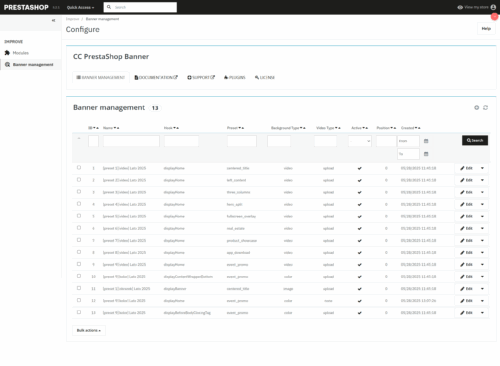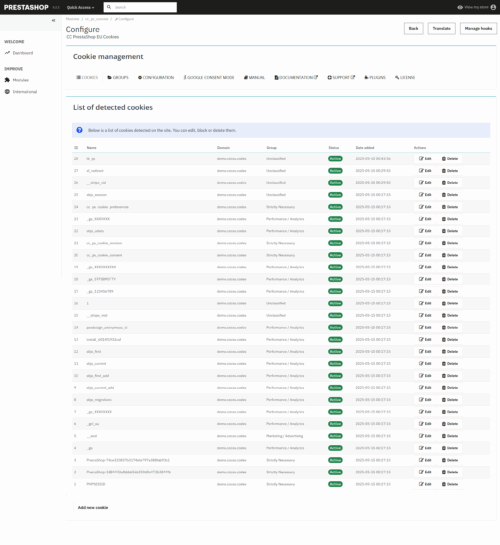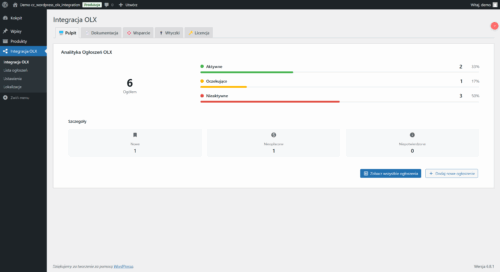CC Meta Facebook Pixel Documentation
Comprehensive documentation for the cc_facebook_pixel plugin.Table of contents
1. introduction
2 Installation
3. license activation
4. basic configuration
5. tracking modes
6. server-side tracking
7. event queuing
8. custom events
9. advanced matching
10. debugging
11 Troubleshooting
12 FAQS.
1. introduction
CC Facebook Pixel is a professional plugin for WordPress that enables full integration of the site with Facebook Pixel and Conversions API. It allows tracking user activity on both the browser and server side for more accurate and reliable conversion tracking, even when users use ad blockers.The plug-in allows full control over:
- Integration with Facebook Pixel via JavaScript and/or Conversions API
- Tracking standard events (PageView, ViewContent, etc.).
- creation and implementation of custom events
- advanced matching of user data
- Event queuing for optimal performance
- debugging and integration testing
2 Installation
System requirements- WordPress 5.0 or later
- PHP 7.0 or later
- Download the ZIP file of the plug-in from official store
- Log in to your WordPress admin panel
- Go to: Plugins > Add New > Submit Plugin
- Select the downloaded ZIP file and click "Install Now".
- When the installation is complete, click "Enable plug-in"
3. license activation
It is necessary to activate the license before using the plug-in:- After installation, go to the tab Settings > Facebook Pixel
- Click the tab License
- Enter the license key you received after purchase
- Click "Activate License"
- After successful activation, you will see a confirmation message
Warning
Without an active license, the plug-in will work in limited mode, without the ability to edit settings and configure tracking.
4. basic configuration
To configure the basic settings of the plugin:- Go to: Settings > Facebook Pixel
- In the "Main settings" section, enter your Facebook Pixel ID
- Select the tracking mode (Browser only, Server only, Hybrid)
- Enable or disable standard events
- Click "Save Changes."
// Przykładowy Facebook Pixel ID
123456789012345Tip
The Facebook Pixel ID can be found in the Facebook Events Manager in the Pixel settings section.
5. tracking modes
The plug-in offers three tracking modes that can be selected according to your needs:Browser only (JavaScript Pixel)
In this mode, events are sent only through the JavaScript Pixel in the user's browser. This is a classic tracking method that can be blocked by adblocks.
Server only (Conversions API)
In this mode, events are sent only by the server using Facebook Conversions API. This is a more reliable way of tracking that is not blocked by adblockers, but requires additional configuration.
Hybrid (browser + server with deduplication)
In this mode, events are sent through both JavaScript Pixel and Conversions API, with a deduplication mechanism that prevents double counting of events. This mode provides the highest tracking accuracy.
Info
Hybrid mode is recommended for most sites because it combines the advantages of both tracking methods, providing greater accuracy of conversion data.
6. server-side tracking
To set up server-side tracking (Conversions API):- Make sure "Server only" or "Hybrid" mode is selected.
- In the "Server-Side API Tracking" section, enter the Access Token
- Optionally, enable test mode and enter the test event code
Warning
Access Token is a confidential key that should be protected. Do not share it with third parties and do not place it in public places.
- Go to Event Manager at business.facebook.com
- Choose "Data Sources".
- Go to "Settings"
- In the section "Configure direct integration". select link "Generate access token". generate an API access token
7. event queuing
The event queuing function allows deferral of server-side event processing, which significantly improves site performance:- In the "Server-Side API Tracking" section, enable the "Event Queuing" option.
- Go to the "Event Queue" tab to configure and monitor the queue
For optimal performance, we recommend setting up a cron job on the server:
- In the "Event Queue" tab, copy the URL to cron
- Add a cron task on the server that will call this URL every 5 minutes
// Przykładowa komenda cron dla wget
*/5 * * * * wget -q -O /dev/null https://demo.cocos.codes/cc_facebook_pixel?cc_facebook_pixel_cron=1&key=XXXXXXXXXXXXXXXXXXXXXXXXXXXXXXXX >/dev/null 2>&1
// Przykładowa komenda cron dla curl
*/5 * * * * curl -s https://demo.cocos.codes/cc_facebook_pixel?cc_facebook_pixel_cron=1&key=XXXXXXXXXXXXXXXXXXXXXXXXXXXXXXXX >/dev/null 2>&1
Note
Event queuing also works without an external cron job, using the built-in WordPress Cron mechanism, but an external cron job provides more reliable and timely event processing.
8. custom events
The plugin allows you to add custom JavaScript events:- In the "Custom Events" section, enter your own event code
- Choose where to insert the code (header or footer of the page)
// Przykładowy kod niestandardowego zdarzenia
fbq('track', 'MojeZdarzenie', {
parametr1: 'wartosc1',
parametr2: 'wartosc2'
});Warning
In "Server Only" mode, custom JavaScript events will not be sent because Facebook Pixel code is not injected into the page then. Change the tracking mode to "Hybrid" or "Browser Only" if you want to use custom JavaScript events.
9. advanced matching
Advanced matching allows additional user data to be sent to Facebook, improving tracking efficiency:- In the "Advanced Matching" section, enable the "Enable Advanced Matching" option.
- Check the boxes of the user data you want to transfer:
- Phone
- Name
- Name
- City
- Province
- Zip code
- Country
Tip
Advanced matching works best when users are logged into your site. For non-logged-in users, the plugin will try to retrieve data from the forms they fill out.
10. debugging
The plugin offers powerful debugging tools to help troubleshoot Facebook Pixel integration issues:- In the "Debugging Settings" section, enable the option "Enable debugging mode"
- Go to the "Debugging" tab to access the debugging tools
- Test Server-Side API - sends a test event through the Conversions API
- Test JavaScript Pixel - opens a page with an active JavaScript Pixel
- API Logs - displays API request and response logs
Tip
In debug mode, the plug-in generates detailed logs that can be used to diagnose problems. The logs are saved in the directory /wp-content/uploads/cc-facebook-pixel-logs/..
11 Troubleshooting
Events are not sent- Verify that the correct Facebook Pixel ID has been entered
- Make sure the license is active
- Check if the selected tracking mode is suitable for your needs
- For server-side tracking, validate the Access Token
- Turn on debug mode and check the logs
- Make sure that WordPress Cron is working properly
- Consider setting up an external cron job
- Verify that the server has the proper permissions to send HTTP requests
- Verify that the Access Token is correct and active
- Make sure the correct version of the API is selected
- Turn on test mode and check that test events are sent correctly
- Check API logs to identify potential problems
12 FAQS.
What is the Facebook Pixel?Facebook Pixel is an analytics tool that allows you to track user activity on your website and use that data to target ads on Facebook, Instagram and the Audience Network ad network.
What is the difference between JavaScript Pixel and Conversions API?
JavaScript Pixel runs in the user's browser and can be blocked by adblocks. Conversions API runs on the server side and cannot be blocked by adblocks, providing more reliable conversion tracking.
Can I use the plugin without an active license?
The plug-in will work in restricted mode without an active license, allowing you to preview settings, but you will not be able to edit the configuration or use advanced features.
Does the plug-in slow down the loading of the page?
The plugin has been optimized for performance. The server-side event queuing feature significantly reduces the impact on page loading time.
Is the plug-in compliant with RODO/GDPR?
The plugin itself does not collect personal data, but it does allow data to be sent to Facebook. It is the site owner's responsibility to ensure compliance with RODO/GDPR, including obtaining appropriate consents from users.
Can I exclude specific users from tracking?
Yes, in the "Debugging settings" section you can select user roles that will be excluded from tracking.
How can I check if Facebook Pixel is working properly?
Enable debug mode and use debug tools to test the integration. You can also use the extension Facebook Pixel Helper For Chrome browser.
What happens if I turn off event queuing?
Server-side events will be processed synchronously, which can slow down page loading, especially with heavy traffic.
Where can I get help if I have problems with the plug-in?
Technical support is available to license holders. Contact us via support page.









